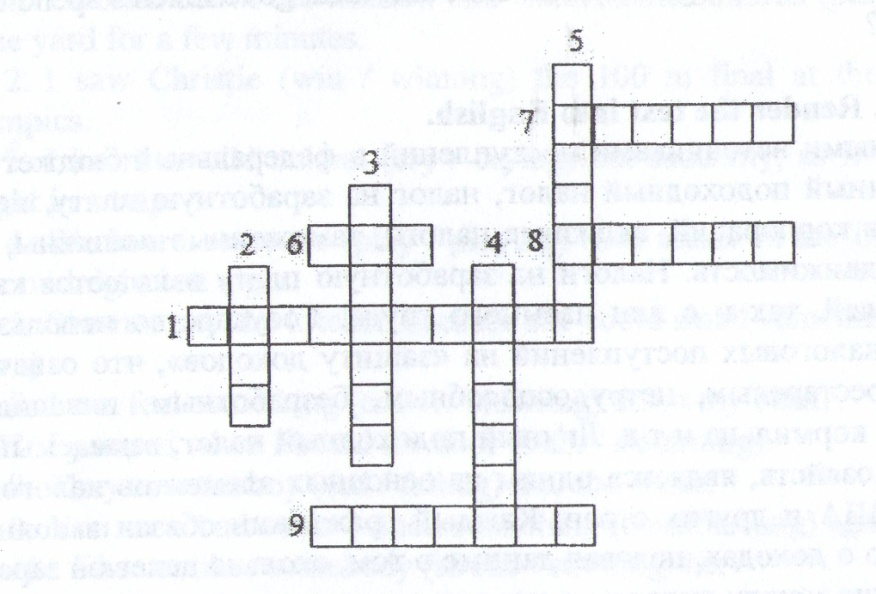
- •Lesson I basics of economics
- •Vocabulary
- •Grammar
- •Lesson II
- •Introduction to microeconomics
- •Vocabulary
- •Grammar
- •Lesson III types of businesses
- •Vocabulary
- •Grammar
- •Lesson IV market structure
- •Vocabulary
- •Grammar
- •Lesson V
- •International trade
- •Vocabulary
- •Useful Words and Phrases of Scientific Communication at a round-table discussion, conference, scientific meeting, __________seminar, symposium, congress, etc.
- •Grammar
- •Lesson VI
- •Vocabulary
- •Grammar
- •Lesson VII russian economy
- •Vocabulary
- •Grammar
- •Lesson VIII marketing today
- •Vocabulary
- •Grammar
- •Lesson IX advertising
- •Vocabulary
- •Grammar
- •Lesson X system of taxation
- •Vocabulary
- •Grammar
Vocabulary
to impose / charge a tax - налагать налог
to levy a tax - облагать налогом
payroll tax - налог на заработную плату
earning - заработок
in addition - кроме того
equal - равный
disabled - нетрудоспособный, инвалид
retirement pension - пенсия за выслугу лет, по старости
to file a report - заполнять декларацию
to state - заявлять, устанавливать
modest - скромный
percentage - процентное соотношение
marginal - предельный
excise tax - акцизный сбор
item - 1) пункт, статья; 2) вид товара, изделие
customs duties - таможенные пошлины
welfare - благосостояние
bond - облигация
receipt(s) - денежные поступления, приход
sales tax - налог с продаж
property tax - налог на имущество
to benefit — оказывать благоприятное воздействие
Task 1. Find in the text English equivalents for the following.
Получать доход; обеспечивать безопасность; уйти на пенсию; кроме того; это означает; в случае; доход домохозяйств; два главных вида налогов; налог на зарплату; из заработка; равную сумму; заполнить декларацию; указать доход; скромная величина дохода; налагаться на ввозимые товары; выпускать облигации; процент на облигации; расходы на вооружение; налог на имущество; непосредственно улучшать благосостояние людей.
Task 2. Guess the words according to their definitions to do the puzzle.
1) the group of people who are responsible for controlling a country or a state;
2) a document containing the agreement by a government or a company to pay you interest on the money you have lent;
3) one of major taxes imposed on all households in America which is equal to seven and a half percent of their earnings;
4) a) the general health, happiness and safety of a person; b) practical or financial help that is provided by the government, for people or animals that need it;
5) money that a government receives and usually spends on schools and on other programmes that directly benefit people;
6) money that you have to pay to the government so that it can pay for public services;
7) taxes which are levied on the sale of certain items (mostly tires for cars, gasoline, alcohol and cigarettes);
8) to charge, levy, force a person to pay a tax;
9) an amount of money that is paid regularly to somebody by the government, esp. if one is disabled and cannot work.

Task 3. Restore the sentences below:
1. There are two major taxes___.
2. The first of this is the___.
3. The Federal Government___of the earning in payroll taxes.
4. The Government__the money from payroll taxes for___.
5. The payroll tax__security to a US citizen amd to his children in the event of___.
6. The second major federal tax imposed on all households is___.
7. In addition to payroll taxes and personal income taxes, the federal government also receives___.
8. The federal government spends___of its money on the income security programmes and___of federal expenditures on military,
9.___are stores as consumers make their purchases.
10. State and local governments spend their___on programmes that
directly benefit people.
Task 4. Find the answers to the following questions:
1. Where does the government get its money?
2. How many percent of the earnings do the Americans pay for payroll taxes? What about Russians?
3. Who pays no income tax?
4. Who pays 15% of income tax?
5. What kind of items are excise taxes levied on?
6. What items are customs duties levied on?
7. How does the federal government spend the money from taxes?
8. Why does the US government issue bonds?
9. What kind of programmes do state and local governments spend their receipts for?
Task 5. Render the text into English.
Основными источниками поступлений в федеральный бюджет являются личный подоходный налог, налог на заработную плату, налог на прибыль корпораций, акцизные налоги, таможенные пошлины, налоги на недвижимость. Налоги на заработную плату взимаются как с работодателей, так и с лиц наемного труда. Государство использует деньги от налоговых поступлений на «защиту доходов», что означает помощь престарелым, нетрудоспособным, безработным, инвалидам, семьям без кормильца и т.д. Личный подоходный налог, взимаемый со всех домохозяйств, является одним из основных элементов налоговой системы США и других стран. Каждый гражданин обязан заполнять декларацию о доходах, подавая данные о том, сколько денег он заработал. Различие между налогом с продаж и акцизным налогом заключается в сфере действия налога. Налог с продаж взимается с многих видов товаров, в то время как акцизные налоги налагаются на определенные предметы потребления: алкоголь, табак, бензин и т.д.
Task 6. Find additional information and conduct a round-table discussion on:
1. The income of federal government.
2. The percentage of major taxes in the US to the tax rates in Russia.
3. Income security: problems and perspectives.
